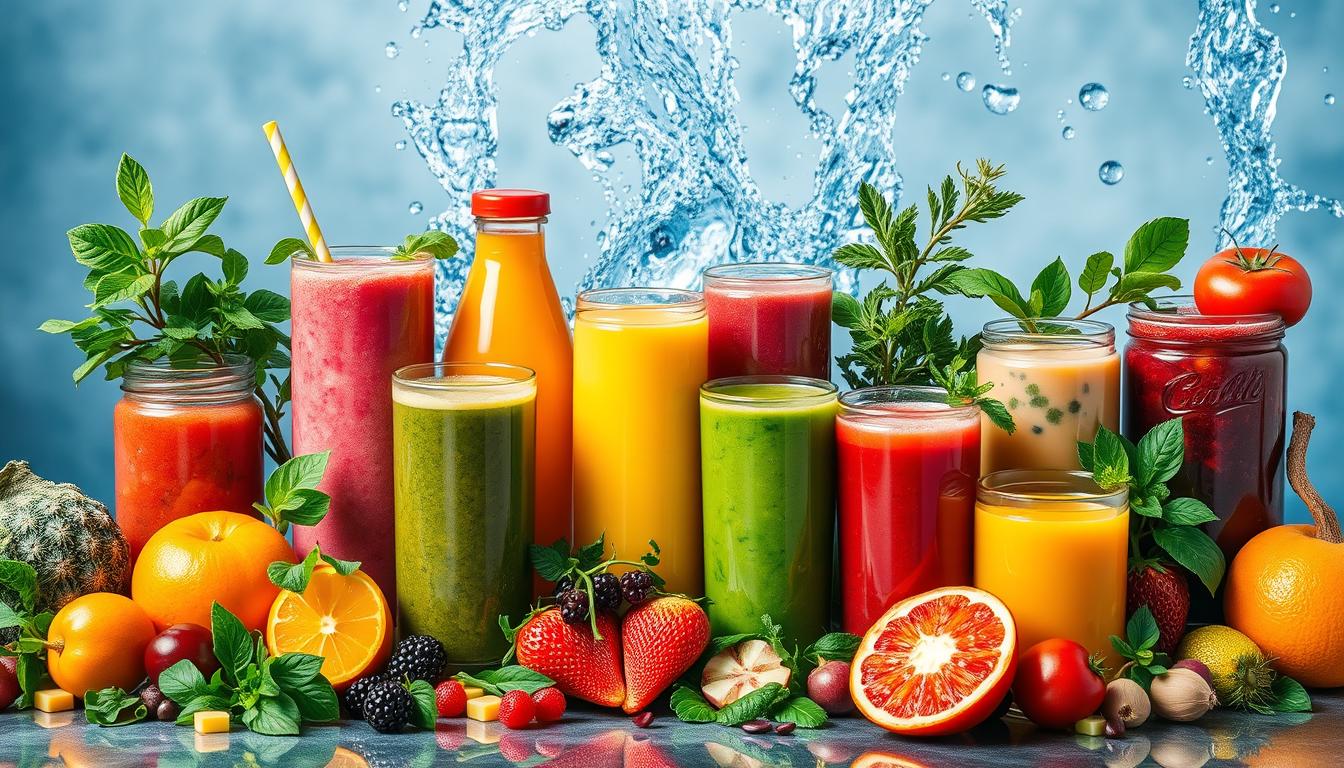Staying properly hydrated is key to good health, especially when you’re active. Our bodies are mostly made of water, between 50 to 75 percent. This water helps with blood, digestion, and even forms sweat. It’s found in our muscles, fat, and bones too. Keeping hydrated during exercise is vital. It keeps our body working well and avoids being dehydrated.
When you’re active, you use more water, mainly through sweat and breaths. To stay hydrated, drink 17 to 20 ounces 2 to 3 hours before you start, and then 8 ounces just before. While working out, aim to drink 7 to 10 ounces every 10 to 20 minutes. This will keep you hydrated12.
Key Takeaways
- Proper hydration is vital for overall health and bodily functions.
- Drink 17 to 20 ounces of water 2 to 3 hours ahead and 8 ounces 20 to 30 minutes before exercise.
- During workouts, consume 7 to 10 ounces of water every 10 to 20 minutes.
- Hydration prevents dehydration and maintains performance.
- Recognize the signs of dehydration such as dark yellow urine and muscle cramps.
The Importance of Hydration During Exercise
Being well-hydrated is key for top sports performance. Even a small drop in body water levels can make it hard for athletes to focus, move well, and remember important things. So, keeping hydrated is crucial.
Impact on Performance
Performance falls just by a two percent drop in body weight from sweating during activity3. This can mean feeling sick and even causing dehydration symptoms like throwing up and diarrhea3. Drinking enough water during long exercises stops dehydration, helping athletes stay at their best4.
Physical Benefits
Drinking enough water helps move oxygen to muscles and keeps joints smooth, boosting your physical state. Not drinking enough can mess with how well you train and increase stress, hurting your overall fitness4. Water-rich foods like oranges and watermelon also help keep fluid levels up3.
Heat-related Illness Prevention
Staying hydrated stops heat-related sickness by aiding your body in keeping cool. Not drinking enough while being too hot can oddly make you better at handling heat, preparing you for warm weather4. After working out, it’s smart to drink 125-150% of what you lost to fully hydrate, avoiding dehydration risks3.
How to Maintain Proper Hydration Levels During Exercise
Staying properly hydrated is key for top performance, health, and feeling good. Make sure you drink enough before, during, and after workouts. Here are some easy-to-follow tips for staying hydrated while you exercise.
Pre-Exercise Hydration Tips
Start hydrating early before you start working out. About 17 to 20 ounces of water a couple of hours before can be very helpful to get your body ready5. Also, it’s smart to sip another 8 ounces 20 to 30 minutes before exercising. This keeps your hydration levels up without overdoing it right before, which can be harmful5.
Water Intake During Workouts
Drinking fluids consistently during exercise is crucial. A good rule is 4 to 8 ounces every 15 to 20 minutes56. But, this amount might change based on how hard you’re working, the weather, and how much you sweat. For exercises that last longer than 45 minutes, consider sports drinks. They help replace lost electrolytes and can boost your performance6.
Post-Exercise Rehydration
Rehydrating after working out is just as important. For every pound you lose during exercise, aim to drink about 3 cups of water5. You can also use a sports drink or eat water-rich foods like fruits and vegetables to help restore your hydration levels faster.
| Hydration Phase | Recommended Intake | Notes |
|---|---|---|
| Pre-Exercise | 17-20 oz (hours before) + 8 oz (20-30 minutes before) | Avoid chugging large amounts to prevent hyperhydration5 |
| During Exercise | 4-8 oz every 15-20 minutes | Adjust based on climate, intensity, and sweat rate56 |
| Post-Exercise | 3 cups per pound lost | Include high water content foods |
Signs You Might Be Dehydrated
Knowing the signs of dehydration is key to staying healthy. Your body can give you hints it needs more water.
Physical Symptoms
If your urine is dark yellow, you might be dehydrated. A person should aim for urine to look like pale lemonade. Being dehydrated makes you tired because you’re losing more fluid and salt than you’re getting7. You might also feel muscle cramps and dizzy. Recognizing these can help you prevent dehydration.
Performance Indicators
Athletes might feel their energy and focus drop when they’re dehydrated. When you lose too much water, your blood pressure can fall. This can make you feel dizzy, tired, or have trouble concentrating7. It’s crucial for athletes to drink enough water all the time, especially during exercise7. By watching for these signs of dehydration, athletes can act fast and avoid negative effects on their performance and health.
Recognizing dehydration signs early isn’t just for athletes. It helps avoid serious issues like heat exhaustion and heatstroke. Remembering these signs and acting quickly is critical for drinking enough water.
Optimal Daily Water Intake for Athletes
It’s key for athletes to understand the best ways to stay hydrated. Women should aim for about 2.7 liters a day, while men need around 3.7 liters8. Athletes may require more because they lose fluids through sweat. We will look at what influences these needs next.
General Guidelines
About 20% of what we need for hydration comes from food, and the rest from drinks like water or sports drinks8. During hard exercise, people sweat a lot, up to 2 liters an hour. This means they must drink enough to replace what they lose8. The American College of Sports Medicine recommends drinking 0.4 to 0.8 liters of fluids every hour for long workouts. Shorter activities need about 0.4 liters per hour8. Following these tips helps athletes stay well-hydrated every day.
Factors Influencing Water Needs
Many things can affect how much water an athlete needs. Things like hot weather or high humidity make you lose more fluids. Your size, how you burn energy, and how hard you exercise are also important8.
High-intensity exercise increases the need for a steady water intake. According to the International Society of Sports Nutrition, you should aim to drink 12 to 16 ounces of fluids every 5 to 15 minutes during hard workouts8. For rehydration, drinks with 6 to 8% carbohydrates and 300 to 600 milligrams of sodium are ideal. They help replace lost electrolytes.
To figure out your exact needs, checking your urine color and weight change after exercise is helpful. Clear to light yellow urine means you are well hydrated, while dark urine shows you need more water8. Creating a plan tailored to your needs will help you drink the right amount of water. This can improve your performance and wellbeing.
For further detailed water intake recommendations, check out how much water you should drink for more information.
Source Links
- Hydration for Athletes – familydoctor.org
- Hydration Tips for Athletes | Mass General Brigham
- The Importance Of Hydration During Exercise | AFA Blog
- Hydration during intense exercise training – PubMed
- Your Ultimate Guide to Hydrating During Every Part of Your Workout
- Sports and Hydration for Athletes: Q&A with a Dietitian
- Recognizing Dehydration Symptoms in Athletes
- How Much Water Should An Athlete Drink Each Day?






